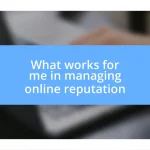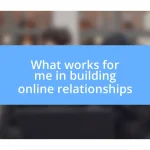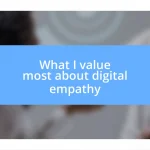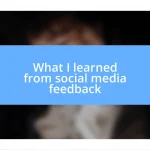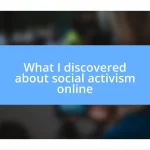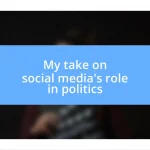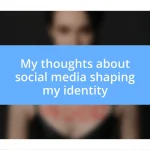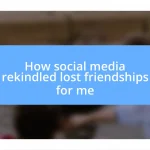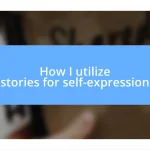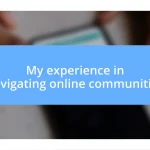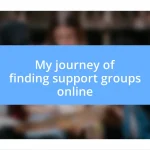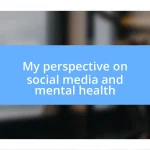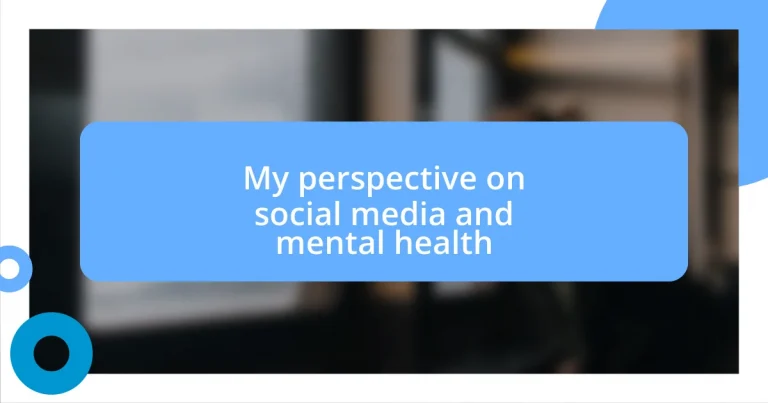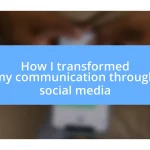Key takeaways:
- Social media can create a false sense of reality, leading to feelings of isolation and inadequacy through comparison.
- It also fosters positive connections and self-expression, offering support through communities and personal growth opportunities.
- Recognizing both the negative impacts and the value of seeking support and resources is essential for mental well-being.
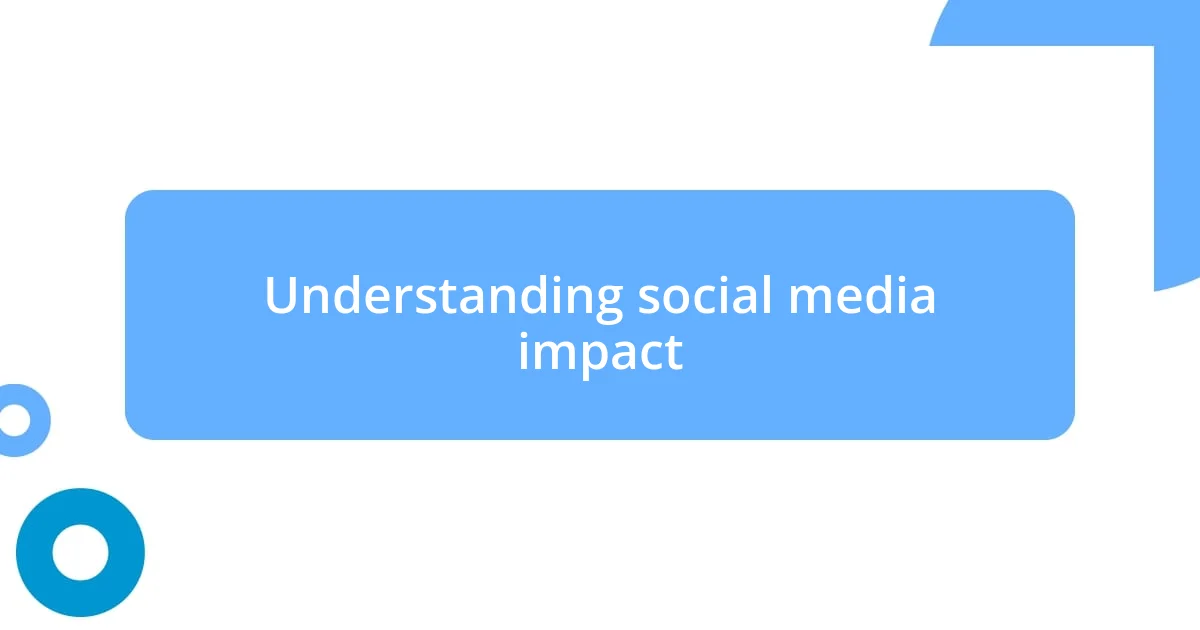
Understanding social media impact
Social media undeniably shapes our lives in profound ways. I remember a time when scrolling through my feed seemed harmless, but I soon realized how easy it was to compare my life to the curated highlights of others. Has that ever happened to you? It’s eye-opening to see how platforms, while connecting us, can also create a false sense of reality that impacts our self-esteem.
The dopamine rush from likes and shares can be addictive, making us crave validation more than genuine connection. It’s a bittersweet double-edged sword; on one hand, I cherish the friendships formed online, yet on the other, I often find myself feeling isolated amidst a sea of “friends.” Have you ever felt that tug between wanting to stay connected and the nagging feeling of loneliness that sometimes creeps in?
Understanding social media’s impact is not just about recognizing the negatives; it’s also about appreciating what we can learn from our experiences. There’s power in reflection, and I often take a break to assess how social media affects my mood. When was the last time you evaluated how you feel after a scroll? It’s something that can truly awaken us to the healthy boundaries we might need.
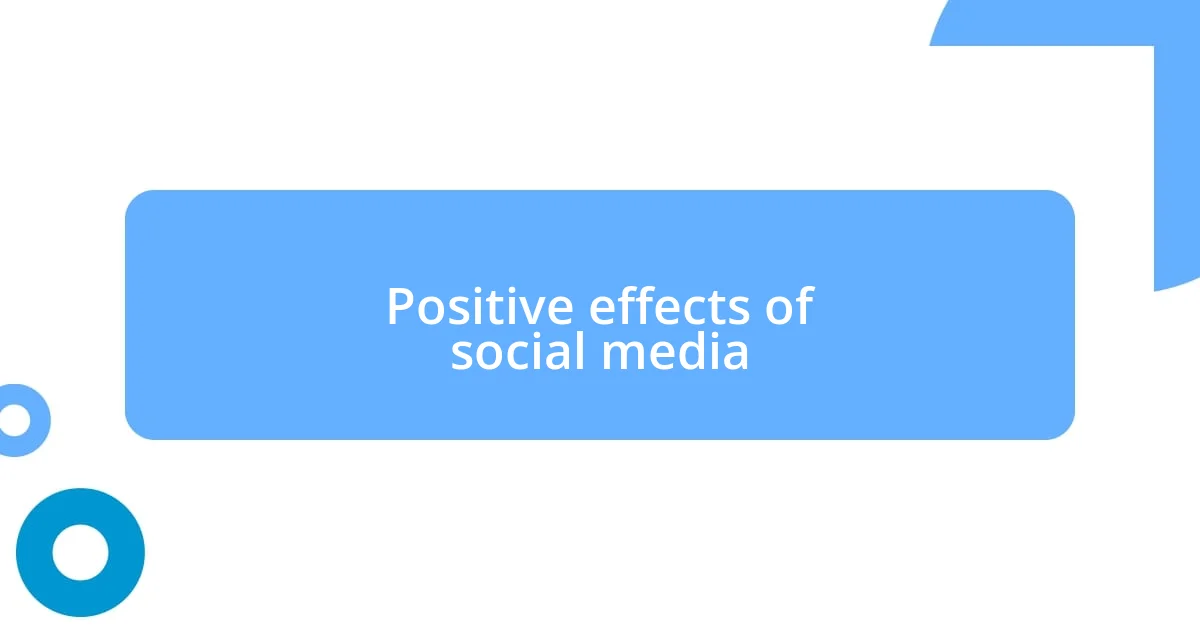
Positive effects of social media
Social media can be a source of positivity, serving as a platform for connection and support. I’ve found that engaging with communities of shared interests has enriched my life, as these groups often provide a sense of belonging that can be hard to find offline. Have you ever stumbled into a niche community where you felt completely understood? It’s amazing how much comfort and camaraderie can arise from these digital spaces.
Moreover, social media has played a role in raising awareness about mental health issues. I remember a time when I came across a heartfelt post about anxiety that resonated deeply with me, making me feel less alone in my struggle. It was like a light bulb moment; the shared stories and resources helped me understand that many others were grappling with similar feelings. Isn’t it remarkable how a single post can spark conversations that break down stigma?
Lastly, I truly appreciate how social media acts as a platform for self-expression. Whether it’s through art, writing, or even sharing daily experiences, I’ve found that allowing myself to be vulnerable online has fostered personal growth. Each post offers an opportunity to explore my creativity, and the feedback I receive often fuels my passion. Have you ever felt inspired to share something personal? It’s these moments of authentic connection that can illuminate our paths.
| Positive Effects | Personal Experiences |
|---|---|
| Fostering Connection | Engaging with niche communities that provide support and belonging. |
| Acknowledging Mental Health | Encountering posts that resonate and promote conversations about mental health issues. |
| Encouraging Self-Expression | Sharing personal stories and creative works that lead to growth and inspiration. |
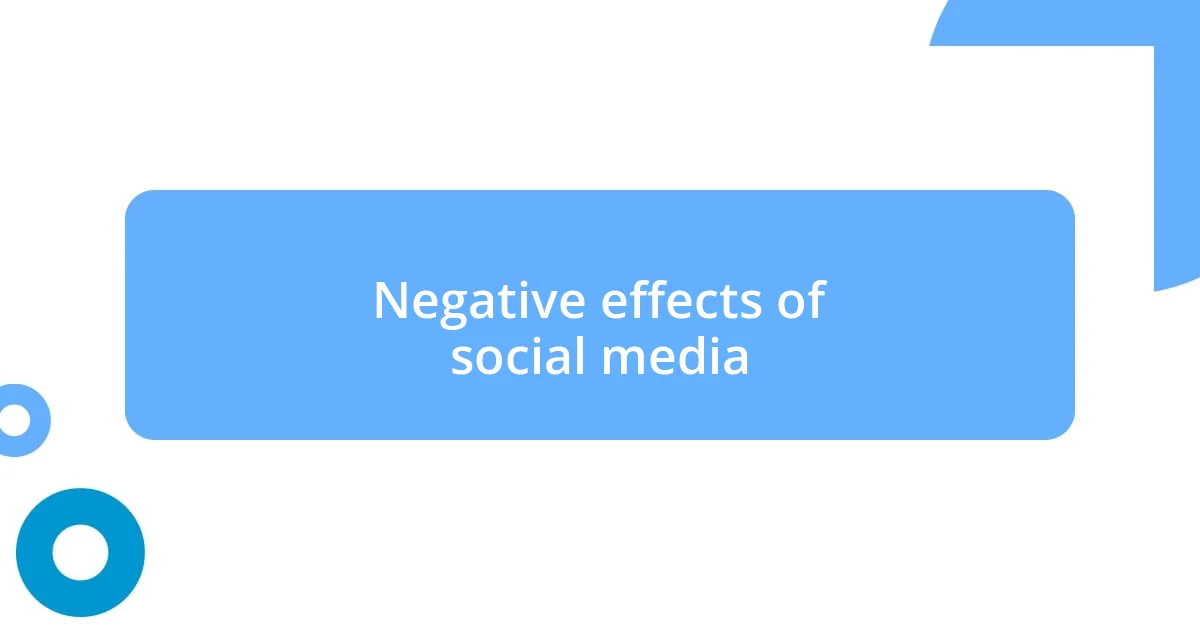
Negative effects of social media
It’s genuinely startling to realize how social media can amplify feelings of inadequacy and anxiety. I’ve often found myself engrossed in a cycle of comparison, feeling a twinge of envy as I scroll. I remember a particularly tough day when a friend posted about a recent vacation—complete with picturesque photos. Instead of feeling happy for them, I felt a pang of sadness about my own life. Have you ever had that gut reaction? It’s a stark reminder of how curated content can distort our perception of reality.
The negative effects of social media manifest in various ways, including:
- Increased Anxiety: The constant barrage of idealized images can lead to feelings of inadequacy.
- Isolation: Despite being connected online, I sometimes feel more alone when I compare my life to others’.
- Sleep Disturbances: Scrolling late into the night often leaves me feeling restless the next day.
- Cyberbullying: I’ve witnessed hurtful comments that not only impact the person targeted but also create a toxic environment for everyone involved.
- Addictive Behaviors: The need for constant updates and interaction can drain my focus from more meaningful, real-world connections.
These aspects can creep into our daily lives, often going unnoticed until they take a toll on our mental health.
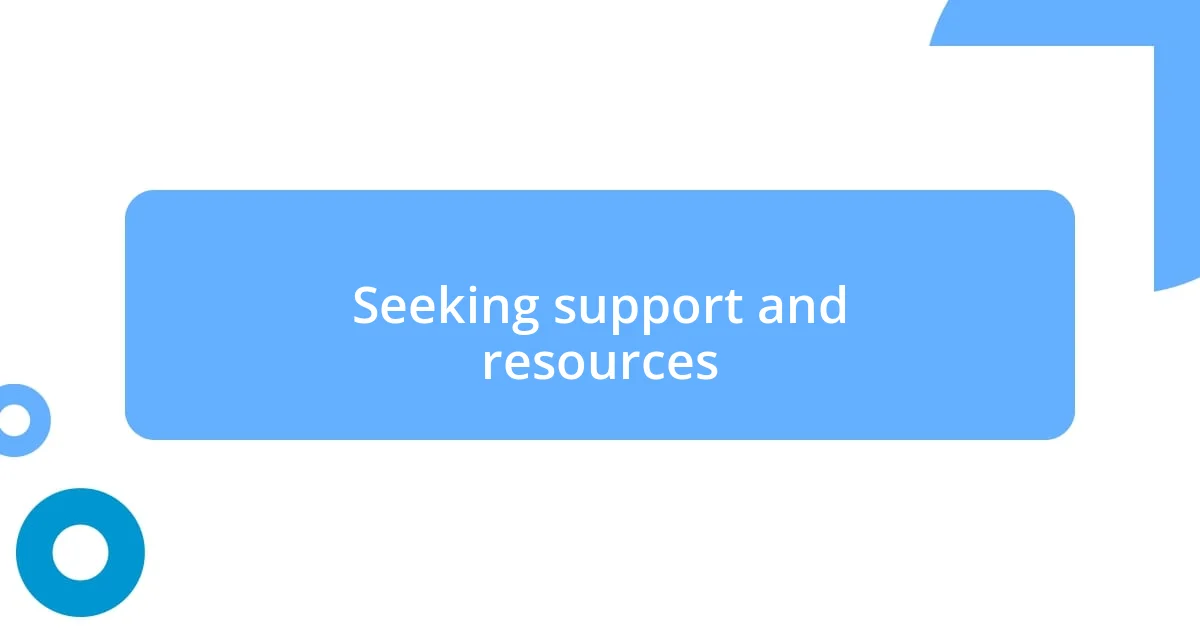
Seeking support and resources
Reaching out for support can be one of the most empowering steps I’ve taken. I had a moment when I felt overwhelmed, and I decided to share my feelings in a group chat with close friends. Their responses were heartwarming and reassuring; have you ever experienced the relief that comes from opening up to someone who truly understands? It’s on days like that I realized how vital it is to connect with others, whether through a supportive friend or an online forum dedicated to mental health.
Resources abound online for those seeking help, and I’ve often turned to mental health apps for guidance. I remember downloading a mindfulness app during a particularly stressful week. Engaging in guided meditations not only calmed my racing thoughts but also connected me with a community of users sharing similar experiences. It’s astounding how technology can foster healing—have you found a resource that resonates with you? These digital tools can often be a lifeline, providing instant access to help whenever we need it.
I’ve gathered valuable insights from various podcasts and YouTube channels focused on mental health topics. Listening to real stories of struggle and triumph has inspired me and offered practical strategies I could implement in my own life. I recall one episode where the speaker talked about the importance of creating boundaries with social media. It made me think—how often do we allow these platforms to dictate our mood? Seeking resources like these can significantly enhance our understanding and encourage us to prioritize our mental well-being.
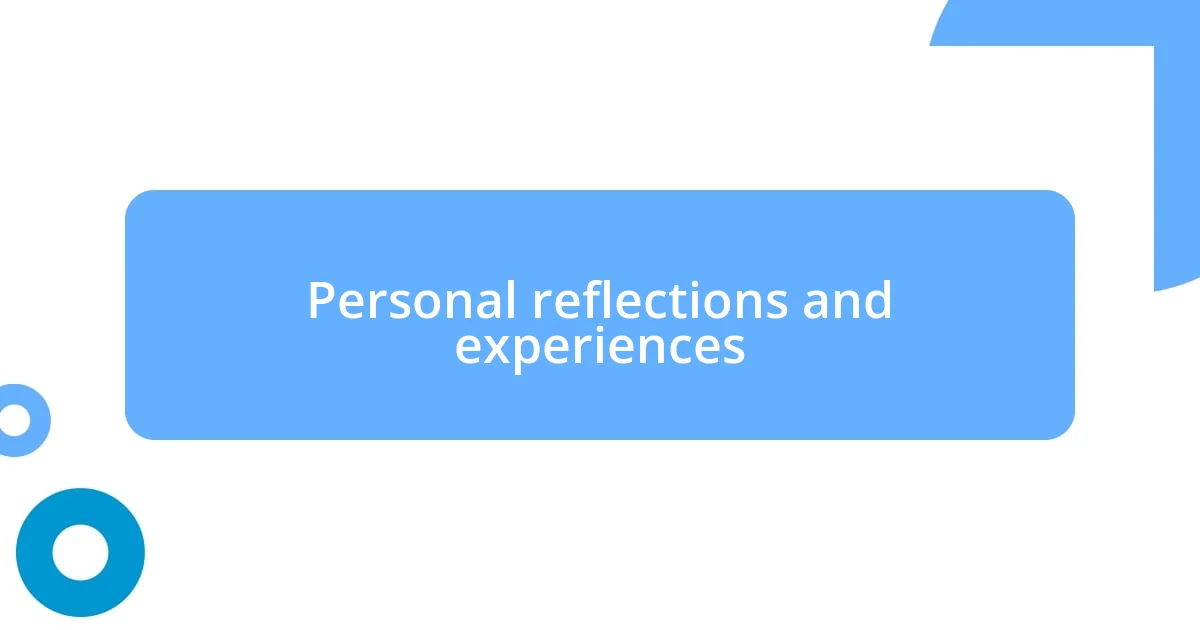
Personal reflections and experiences
There was a time when I became hyper-aware of my social media habits, especially after a night filled with scrolling through feeds while battling insomnia. I remember the moment when it hit me—I was caught in a loop, constantly refreshing my screen as if something significant would appear. Have you ever been in that deep scroll and suddenly realized that hours have passed? It dawned on me that instead of connecting with people, I was only fostering feelings of restlessness and disconnection.
Reflecting on my experiences, I recognize how social media often became a mirror reflecting what I perceived as flaws in myself. Just last month, I posted a photo that I thought captured a happy moment, only to feel the pressure of likes and comments weighing heavily on me. It made me wonder—does my worth fluctuate with these digital affirmations? That realization felt a bit like stepping onto unstable ground; while I sought validation online, I was inadvertently nurturing my insecurities.
I’ve had days where I purposely took breaks from social media, and it was eye-opening. On one such day, I opted to spend time in nature instead of checking my phone. The refreshing breeze and the sounds of rustling leaves filled my heart with a sense of peace I hadn’t felt in a while. I found myself thinking, why don’t I prioritize this experience over online validation? It’s a reminder that sometimes, disconnecting from the digital realm allows us to reconnect with ourselves.
